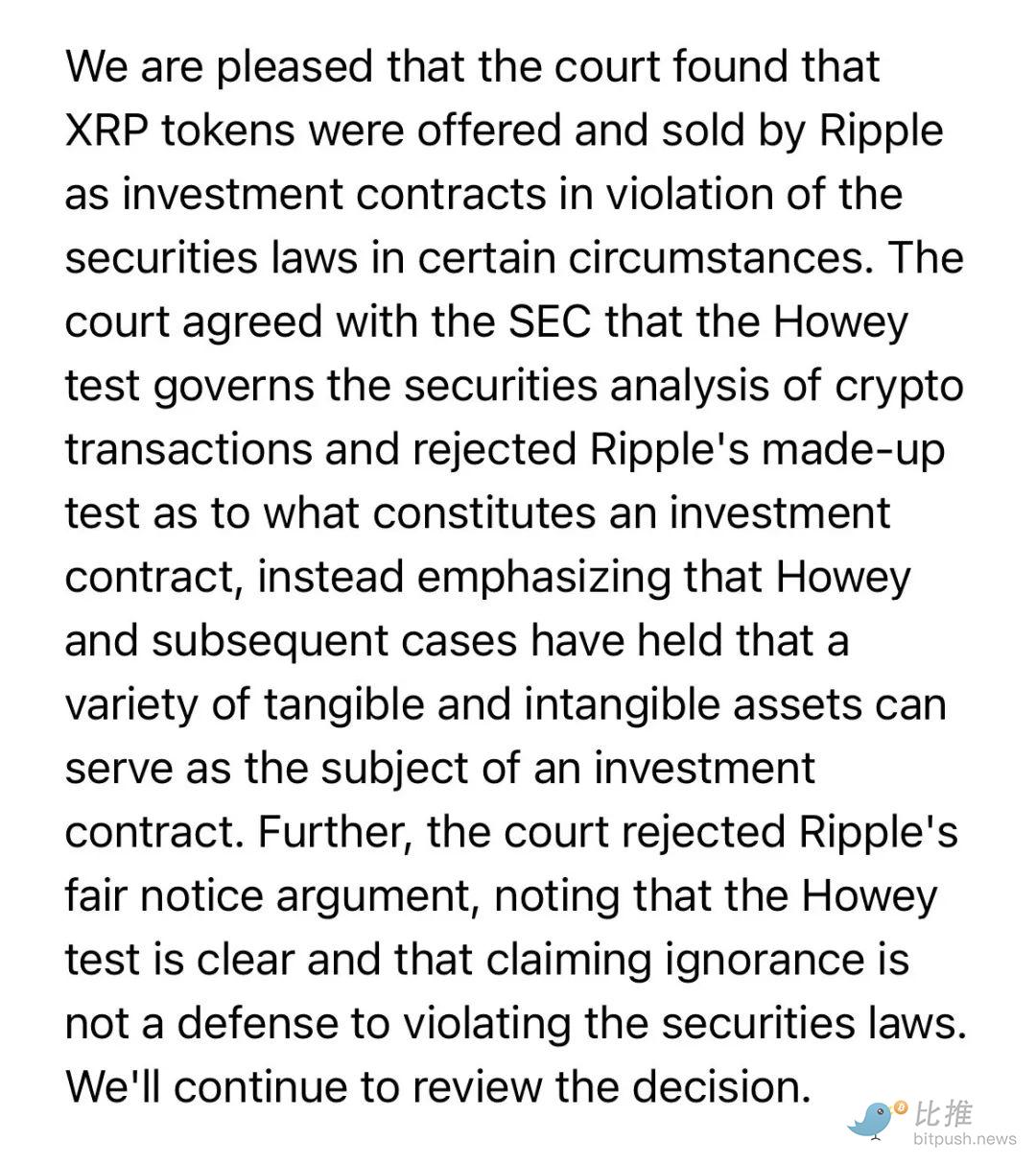Author|Wu on Blockchain
Wu learned that the Southern District of New York ruled that the SEC sued Ripple and concluded that Ripple’s programmatic sale of XRP and other distributions does not constitute an offer and sale of investment contracts; but Ripple’s XRP institutional sales constitute a violation of the unregistered offer and sale of investment contracts under Section 5 of the Securities Act.
According to Adam Cochran’s analysis, the judge did rule that institutional sales/fundraising are securities, but the exchange’s programmatic sales did not meet the third aspect of Howey, so selling to users through exchanges is possible, as long as it is through order books rather than ICO/IEO/LaunchBlockingd, etc.; bounties, using XRP for investment in others, grants using XRP, and transfers to executives are not considered securities.
Most importantly, the court emphasizes that the tokens themselves do not belong to “investment contracts”, so they are not securities; instead, sales or other transactions are important. Analysts generally believe that this is an important victory.
- Polygon has released the Polygon 2.0 token economics proposal, which proposes upgrading MATIC to POL.
- Forbes investigates Craig Wright: Whether he is Satoshi Nakamoto is no longer as important
- Will this Dapp be the future of banking when NFTs become Swiss bank accounts?

@ricenbeats0x pointed out that if, as stated in this judgment, listing XRP on exchanges does not make it a security, then SEC’s lawsuit against Coinbase is “finished.”

Bill Hughes, a lawyer at ConsenSys, briefly explained the XRP court ruling: Ripple trading XRP on exchanges (and using these sales to fund its operations) is not an investment contract, so it is not a security; paying wages with XRP is not an investment contract, so it is not a security; Ripple’s direct sale of XRP under the contract is an investment contract, so it is also a security; Ripple is clearly aware that doing so without registration is illegal; Ultimately, a jury is needed to determine whether Ripple executives assisted and abetted this unregistered issuance; it is expected that the SEC will immediately appeal to the Second Circuit Court of Appeals. SEC responded: We are pleased that the court found that Ripple’s offer of investment contracts and sale of XRP tokens in certain circumstances violated securities laws. The court agreed with the SEC’s view that Howeytest governs the securities analysis of cryptographic transactions and rejected Ripple’s fictional test of what constitutes an investment contract, emphasizing that in Howey and subsequent cases, various tangible and intangible assets can be the subject of investment contracts. In addition, the court rejected Ripple’s fair notice argument (another standard for determining securities), stating that Howey test is clear and claiming ignorance cannot be a defense to violating securities laws. We will continue to review this decision.

Following the court’s decision to dismiss the SEC’s lawsuit against Ripple, XRP saw a staggering 72% increase in value in 24 hours, jumping to fourth place in market cap, with a total liquidation amount of $237 million in 12 hours and $52.34 million for XRP itself. XLM rose 57%, ADA rose 22%, and SOL rose 16%. According to Coingecko data, Upbit, the largest exchange in Korea, ranked first in XRP trading volume, with a 24-hour trading volume of $2.1 billion, followed by Binance with $1.7 billion and OKX with $500 million, indicating that “familiar” Korean investors were still a major driving force behind the surge. It is worth noting that XLM and ADA, which ranked second and third in terms of 24-hour increase, also had the largest trading volume on Upbit, the largest exchange in Korea. These two tokens, along with XRP, were early tokens that Korean and Japanese investors were familiar with and actively participated in.
LD Capital researcher JinzeJiang0x0 analyzed that “whether XRP itself is seen as a security has not been directly confirmed, and this document does not cover all of the SEC’s charges.” The court is reviewing different sales and distribution scenarios around XRP, and whether these specific scenarios are sales of securities or investment contracts cannot lead to the conclusion that “air coins are not securities” as many people think. “Programmatic sales” refer to Ripple’s sales to “programmatic buyers” on digital asset exchanges, not all secondary market retail investors. It is incorrect to understand that “air coin secondary sales do not violate securities laws.” This court ruling specifically states that the court did not discuss whether XRP’s secondary market sales constituted investment contract sales, because the SEC did not submit this as a direct issue to the court. The SEC’s accusation of the founder’s unregistered sales of up to $600 million was also not discussed in detail in this court document. Tom Emmer, the House Majority Whip of the United States, said that “the Ripple case is a milestone development that proves that tokens and investment contracts are independent and different, and let us legislate this.” My bipartisan bill, the Securities Clarity Act, perfectly characterizes this concept to provide the regulatory confidence necessary to ensure that the design of the next generation of the Internet conforms to American values.
However, several US lawyers interviewed stated that the logical conclusion is that the secondary sales of XRP are not securities transactions; this will have an impact on the Coinbase and Binance cases; however, the ruling is not binding and even judges in the same regional court may not agree; the judge’s ruling can also be appealed to the Second Circuit Court of Appeals, and many experts predict that this will happen, and the appellate court often overturns the ruling of the trial court judge.
For more updates, please follow the Wu Shuo website or Wu Shuo’s official Twitter and TG channel:
https://www.wu-talk.com/index.php?m=content&c=index&a=show&catid=10&id=16095
Like what you're reading? Subscribe to our top stories.
We will continue to update Gambling Chain; if you have any questions or suggestions, please contact us!